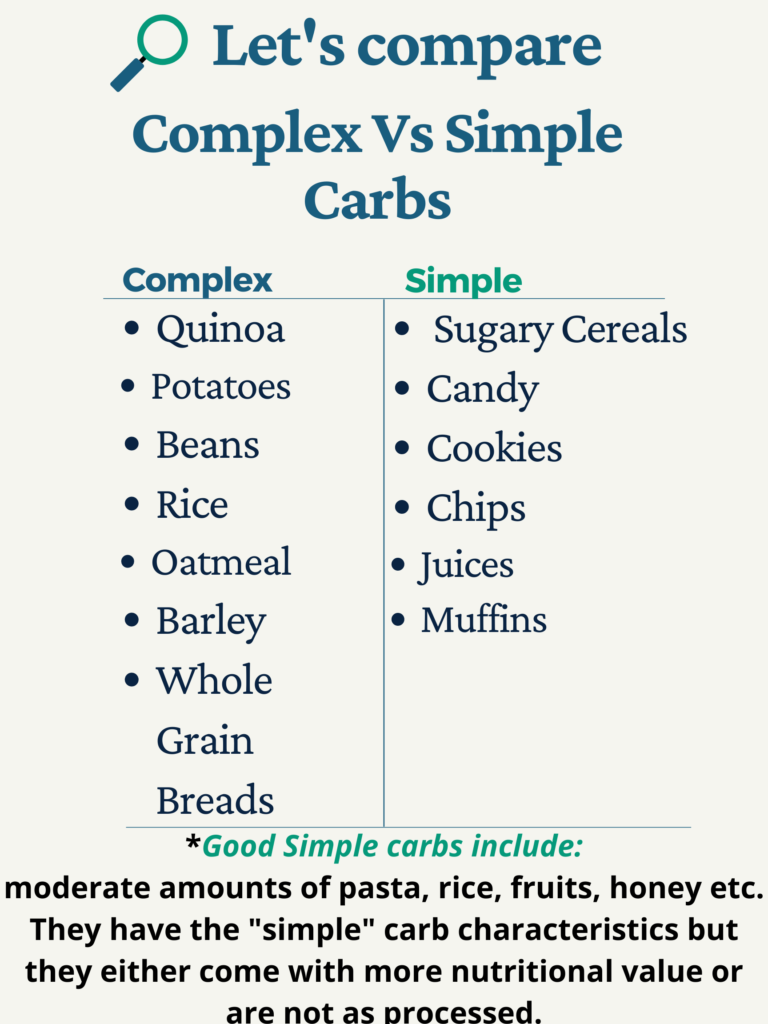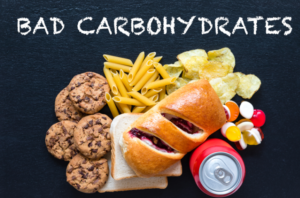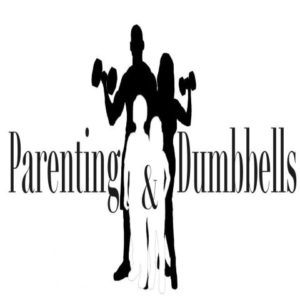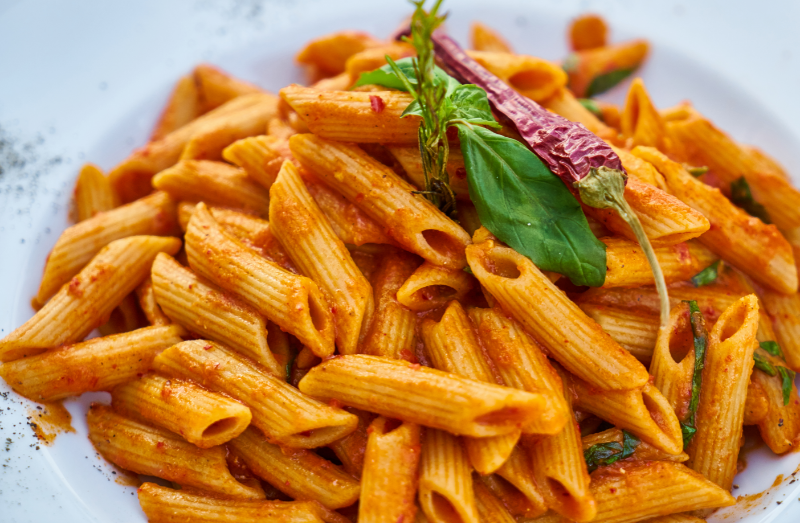Just mention “dieting” and one of the first things you will hear people say is,
“oh, are you cutting carbs?”
We are going to cut through a lot of fluff here and help you understand carbohydrates in simple terms. No fancy language, studies, and contradictions! Just simple science backed facts and experience!
Carbohydrates have in roundabout ways been touted as the main obstacle to weight loss. But…
CARBS ARE NOT THE PROBLEM.
This misinformation stems from a misunderstanding on how the body loses weight, or “fat”.
This has lead people to believe that carbs are the enemy when losing weight, but they are not. While in general, cutting back on carbs can help facilitate weightloss, it is not the actual carbs in it of themselves that are causing weight gain, its the overconsumption of calories containing carbohydrates along with other macronutrients that cause the scale to go up.
What are carbohydrates?
Your body functions on energy. This energy in the human body is made up of units known as calories.
Calories are broken down into three essential macronutrients:
- carbohydrates
- fats
- proteins
You need all three to have your body function properly, and all three have important roles.
Proteins help repair and build your body’s tissues, provide strength and structure to your body, and act as messengers between cells in your body among many other important roles.
Good fats (avocado, olive oil, fish fat etc) help protect your body’s organs, help your body absorb vitamins, and keep blood pressure under control.

Carbohydrates are your body’s main energy source for your cell’s tissues, and organs. At their basic chemical level they are compromised of carbon, hydrogen, and oxygen.
They are made up of fiber, sugars, and starches. We all know what carbs are. They are in everything we love to eat:
- Bread,
- pasta,
- rice,
- jams,
- fruits,
- oatmeal,
- cake, and candy are all examples of carbohydrates.
You can see from the examples above that a wide spectrum of foods contain carbs. From good to bad.
Also known as “Complex Vs Simple Carbs”.
What is the difference between a complex and a simple carb?
The “bad/simple” carbs like refined sugar in certain breads/cereals and sweets like cake, candy etc, have lead the way into the notion that “carbs are the enemy”.
In reality, we forget that “good/complex” carbs like whole grains, fruits, vegetables and moderate consumption of things like rice, pasta and bread are vital to our health and performance whether working out or in everyday life.
The main difference between a simple and complex carbohydrate source is that simple carbs are broken down much faster by your body and have much lower nutritional value than complex carbs. This can lead to unnecessary spikes in blood sugar level and crashes, increasing your hunger and leading you to overeat.
Complex carbs digest slower, providing you with longer lasting energy and are packed with a lot more nutrients.

Things are not that simple with “simple carbs”. Some simple carbs actually do provide nutritional content and have a place in your diet for it’s array of nutritional benefits such as fruits and dairy products (if you can tolerate dairy).
The bad simple carbs are those heavily processed and packaged like sweets, fruit juices, and most junk foods.
How does your body turn carbs into energy?
Your body takes the carbs you eat and turns it into glucose (a simple sugar) which is used as the main source of energy for your body’s cells.
While protein and fats can be used for energy as well, your body turns to carbohydrates first for it’s energy needs.
Any excess glucose gets stored in your body as glycogen in your liver and muscles. Any excess after that is stored as fat.
Do carbs make you gain weight?
No. Carbs in it of themselves DO NOT make you gain weight. The overconsumption of more calories than what your body needs make you gain weight. If you overconsume carbs, or any other nutrient, you will likely overconsume more calories which can cause weight gain.
Each macronutrient (carbs, fats, protein) contains calories.
- Carbs contain 4 calories per gram.
- Fats contain 9 calories per gram.
- Proteins contain 4 calories per gram.
Then why do people lose weight on low carb diets?
Two main reasons:
- Because carbs are calories at their very essence. Carbs are also easy to OVEREAT. Why? Because they are in almost everything you eat! So by cutting carbs, you are cutting calories which can lead to weight loss.
Get it?
- It’s not the carbs doing the trick here and making you lose weight, it’s the fact that by cutting them out you are probably naturally cutting out a lot of calories.
- The second reason is that carbs cause water retention. Each gram of glycogen (how carbs get stored in your body) comes with 3 grams of water.
When you cut out carbs, you use up your glycogen stores and thus secrete all that water that came with it making you think you are dropping pounds and pounds of fat.
In reality, you are depleting your glycogen stores and shedding water weight.
Ever heard that one friend tell you they lost 8lbs in a week because of their “new low carb diet? “
Sorry friend, you probably lost 7lbs of water and 1lb of fat because your calorie consumption went down.
Calorie vs Carb Counting: Should I count calories or carbs?
Calorie counting will lead to better adherence to your diet.
When you go on a weight loss diet and start restricting certain food groups, you miss out on vital functions important to your body performed from certain macronutrients. It is best to focus on your overall calorie intake from nutritionally dense foods that include all the macronutrients.
But Can carbs help you lose weight?
Low carb diets are not needed for weight loss, but they do have it’s merits and yes, they can certainly HELP.
When it comes to satiety and hormonal regulations in your body, low carb diets can HELP you lose weight but we want to keep stressing that it is NOT BECAUSE CARBS MAKE YOU FAT.
When you eat carbohydrates your body will secrete insulin. Insulin helps transport the sugar from carbs into your cells for energy. Since most of the junk food people eat are loaded with carbs, mostly from sugar, this can lead to your blood levels spiking and crashing.
This crash causes more cravings. Which leads you to overeat.
Carbohydrates are also not as filling from a satiety point like proteins and fats, which keep you full longer since they digest slower.
Thus, some studies have suggested that lower carbs reduce appetite and thus help you lose weight.
We also stress the fact that most of the foods you eat contain carbohydrates. When you eliminate carbohydrates from your diet, you naturally eliminate A LOT of foods and are reducing your overall calorie intake which leads to weight loss.
BUT…
Back to the crash from blood levels spiking…
 This spike usually comes from eating highly processed carbs with minimal nutritional content.
This spike usually comes from eating highly processed carbs with minimal nutritional content.
When we take in “good” complex carbs they serve as our body’s energy source. Not only for athletic performance but for vital functions in our bodies.
Carbs help fuel our kidneys, heart and brain. Fiber is also a carb which is essential to helping our digestive systems. Lowering your carbs too much can have detrimental effects. Everything from fatigue to headaches and overall weakness.
If you choose to take the low carb method to lose weight it is best to still keep a decent amount of carbohydrates in your diet.
So how many carbs should I eat a day to lose weight?
The truth will shock you. You can eat any amount of carbohydrates to lose weight as long as you are in a calorie deficit. This means that if you’re dieting on 2,000 calories, you can be eating 2,000 calories or 500g of carbs a day and lose weight!
We have explained why this is above, but to reiterate:
calories at the end of the day is what matters in your weight loss journey.
Now, when we put aside weight loss and focus on performance, aesthetics (appearance), and health, then the amount of carbohydrates (and all other macronutrients) matter.
The Dietary Guidelines for Americans recommend you take in upwards of 45-65 percent of your daily calories from Carbohydrates! That is a lot of carbohydrates!
We also want to remember they are talking about the general population.
How many carbs it takes you personally to lose weight and how many you need will depend on you as the individual.
This is what we are here for, to help parents on their weight loss journey and figure these things out. Reach out to us at parentinganddumbbells@gmail.com .
But the real question should first be:
How many calories do I need to consume for my goal (weight loss, weight gain or maintenance) ?
We laid out a good, baseline method to figure that out in our Fat Loss Article.
Once we have our calories figured out, then we want to assign macronutrients to them.
We believe a good starting point for assigning macronutrients to your total overall calories is:
40% carbs
40% protein
25% fat
This will ensure you are getting enough of the recommended fat intake, moderate carbs and a good amount of protein to build and repair muscle if you are wanting to embark on a fitness routine.
In conclusion, the take away here is carbs are NOT the problem. They are NOT the enemy. People vary differently on how they tolerate carbohydrates. While reducing carbohydrates may have health and weight loss benefits, it also has many drawbacks and for most people cutting out carbs completely on a weightloss journey is not necessary.
The better route is to take in a moderate amount of carbs, fats and protein while focusing on your overall calorie intake when embarking on a weightloss journey.


2 thoughts on “Carbs are NOT the Enemy: A Simple Guide to Understanding Carbohydrates”